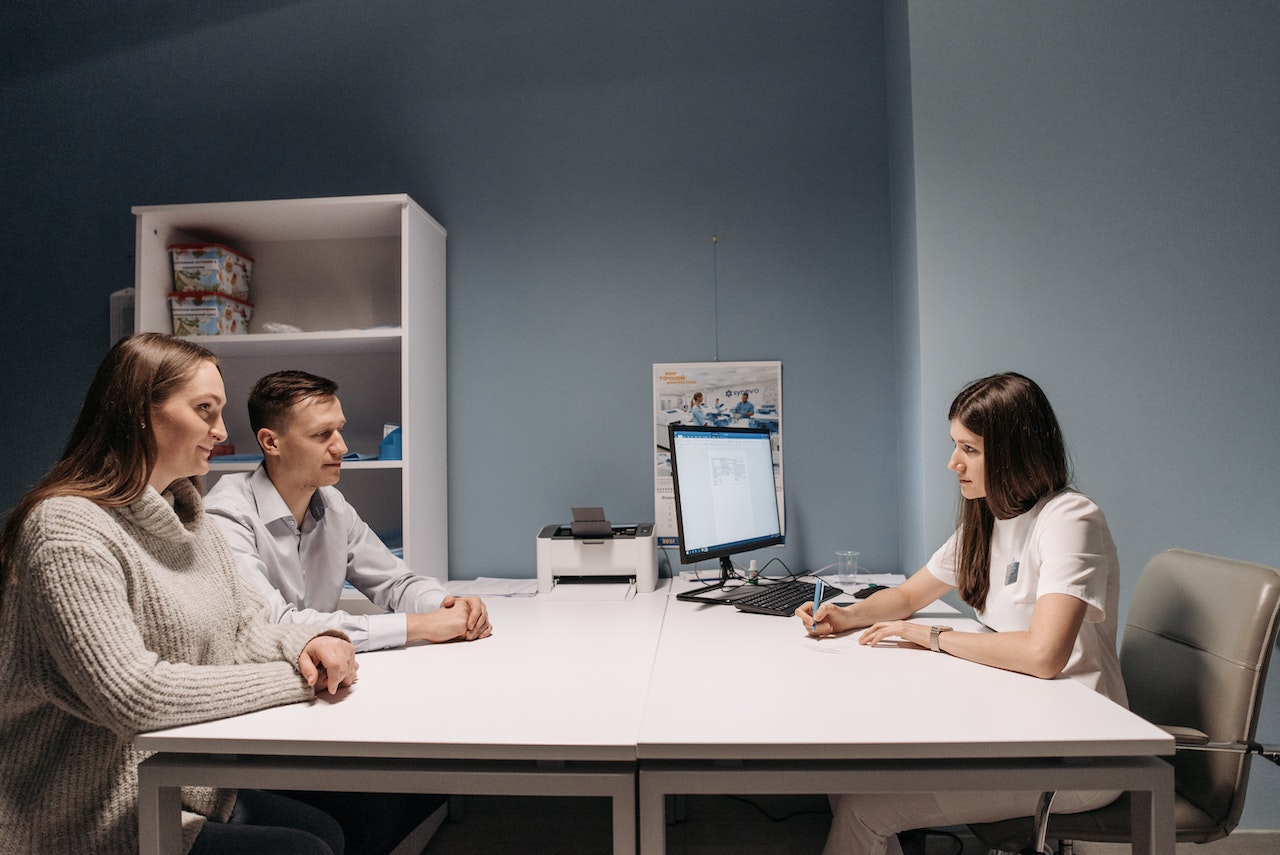Many people have reported that despite opting for IVF (In Vitro Fertilisation), their fertility journey has varied depending on the physician and the clinic. Because of this, it is always advised to talk to the IVF fertility team in order to ask important questions before starting treatment.
This way, you will not only be educating yourself about different approaches but will know what to expect during the IVF treatment and whether you should go for it or not. In this article, we will be telling you what question to ask at IVF consult. So, without further ado, let’s begin.
What Happens at Your First IVF Consultation?
The first IVF consultation is all about creating a roadmap for your fertility journey and is usually 90 minutes long. During this session, you will meet with several doctors and nurses who will conduct an in-depth evaluation of your medical history. Once the professionals have a thorough understanding of your case, they will outline a treatment plan and discuss it with you.
How to Prepare for IVF Consultation
When going for an IVF consultation, ensure you have copies of all your medical records. These should include the following:
- Name any medication, supplement, herbs, or vitamins you take.
- Thorough physical examination of you and your partner.
- Details about your menstrual cycle.
- Any previous fertility treatments.
- Hormonal assessment.
- How long have you been actively trying to conceive?
- Does your family have a history of infertility?
Once you have all the essential documents, take a notebook and write down all questions you plan to ask the IVF fertility team. This helps you stay on track in case you forget anything.
10 Questions to Ask Your IVF Doctor UK
 Going to your first IVF appointment can be confusing. To take some stress off your mind, we have compiled a list of ten questions to ask at an IVF consult:
Going to your first IVF appointment can be confusing. To take some stress off your mind, we have compiled a list of ten questions to ask at an IVF consult:
1.) What Percentage of IVF Is Successful at Your Fertility Clinic?
Did you know that there is a high possibility that you might not get pregnant in your first IVF cycle? Knowing the success rate of the fertility clinic helps you stay positive on the medical journey.
When looking at a clinic’s success rate, question them about clinical pregnancies and live births, ask them if they have ever treated a patient with a similar medical history, and how successful the process was. Discuss how many cycles it takes to get pregnant and what makes their fertility clinic stand out.
This is an important question to ask at IVF consult as it will give you a better idea of your success rate, giving you much-needed reassurance.
2.) What Is the Best Age for IVF?
In the IVF world, the success rate of conceiving decreases as age increases. The optimum and most appropriate age for IVF is between 20 and 35 years. However, women in their 40s and 50s have also successfully conceived and given birth with the help of IVF.
So, it will be fair to say that IVF has no age restriction. But the chances of a successful pregnancy are highest if you are healthy and active. Note that the answer to this question can vary from fertility clinic to clinic.
3.) What Tests Do I Need to Do Before IVF?
Before beginning the IVF treatment, it is important to know what medications you will be taking and what tests your physician requires. While a fertility doctor will probably ask a female patient to get a blood test in order to check for any abnormalities and a test to check the health of the ovary, the male patient will be asked to go through blood tests and semen evaluation.
These pre-cycle tests can be done at any reliable fertility clinic.
4.) Is There Anything that I Can Do to Improve My Chances of IVF Success?
 There are several steps that you can take to improve your chances of IVF success. First and foremost, try to maintain a healthy weight and BMI for your height and age. You should also try to eat a healthy diet as possible and should try to exercise regularly.
There are several steps that you can take to improve your chances of IVF success. First and foremost, try to maintain a healthy weight and BMI for your height and age. You should also try to eat a healthy diet as possible and should try to exercise regularly.
Furthermore, try to keep your stress levels low, as it can have a negative effect on your hormones, making it difficult to conceive. It is important to bring up this question to ask at IVF consult as the doctor will then be able to give you specific recommendations based on your personal medical history.
Other related articles
- Is a test tube baby procedure painful?
- Can I travel after an IVF embryo transfer?
- Day 3 or day 5 embryo transfer
5.) How Long Does an IVF Process Take?
Even though an egg retrieval simulation cycle can take from 10 to 14 days, the numbers can vary depending on how healthy you are and how your body reacts to medications. The clock starts ticking from the moment you start taking the ovarian stimulation medications.
It takes two weeks to retrieve and fertilise the embryo and conduct genetic testing. After getting positive results, the consultant will initiate the embryo transfer cycle, which is usually between days 19 and 21 of the patient‘s menstrual cycle. After ten days post-implantation, a pregnancy blood test is conducted, followed by an ultrasound.
6.) How Much Will the IVF Treatment Cost, and What Will Be Included?
IVF treatment can be expensive. So, it is always wise to know the cost of the IVF treatment beforehand. This helps you set a budget and prepares you for what is to come. In addition to the cost, ask your doctor what is included in one IVF treatment cycle so that you don’t have to pay any hidden charges in the future.
Typically, the standard quote of an IVF treatment should cover the cost of scans, ovarian stimulation drugs, lab procedures, blood tests, and embryo transfer. Note that many fertility clinics do not include the cost of special semen, PGS/FET, egg freezing, and blastocyst culture in the IVF bill. Therefore, talk to your doctor and ask them to provide you with a comprehensive bill before the treatment begins.
7.) What Should I Do If I Face Any Problem During Odd Hours?
Although IVF is a safe treatment, it is wise to be prepared for emergencies. When it comes to this question to ask at IVF consult, the chances are that the doctor will provide you with an around-the-clock active emergency contact number so that you can report your symptoms or seek advice.
This will also help you judge whether the fertility clinic is reliable and an excellent way to test the clinic’s customer service.
8.) Do You Recommend Multiple Embryo Transfer or Single Embryo Transfer?
A few years back, IVF professionals used to rely on multiple embryo transfers as they believed that the implantation of more than one embryo increases the chances of success in infertility cases.
However, today the approach is very different. With the involvement of preimplantation genetic testing (PGT-A) and advanced technology, most fertility consultants recommend a single embryo transfer. Primarily because the transfer of multiple embryos increases the risk of miscarriages and complicated pregnancies.
9.) What Are My Options If the IVF Treatment Fails?
Unfortunately, IVF can and does fail. And when it does, it can be very confusing, heart-breaking, and frustrating. In fact, according to the NHS, the success rate of IVF in the UK is 32% for women under the age of 35, 25% for women aged between 35 and 37, 19% for women aged between 38 and 39, and 11% for women aged between 40 and 42.
Therefore, it is always good to know what other options you have in case the IVF treatment fails.
For example, if you have frozen embryos, there’s a high chance that the doctor might recommend a Frozen Embryo Transfer (FET). On the other hand, if it is your first cycle, the consultant will ask you to try again at a later date.
10.) Are There Any Possible Risks or Side Effects to IVF Treatment?
During an IVF process, the doctor will advise you to take multiple medications that can negatively impact your body. Asking this question to ask at IVF consult helps you in being mentally prepared for whatever is to come based on your medical history. Some potential complications or IVF pregnancy risks are as follows:
- Injections can cause pain.
- Certain IVF drugs come with risks.
- Fertility drugs can cause mood swings.
- Mild bloating.
- Abdominal pain.
- If you have PCOS, there is always a risk of developing Ovarian Hyper-Stimulation Syndrome.
IVF Preparation Checklist
 Riddled with doubt, fear, and long periods of waiting, the journey of IVF can be emotional and overwhelming. Your health plays a critical role in increasing the chances of a successful IVF treatment. Here are nine ways to prepare your body for IVF:
Riddled with doubt, fear, and long periods of waiting, the journey of IVF can be emotional and overwhelming. Your health plays a critical role in increasing the chances of a successful IVF treatment. Here are nine ways to prepare your body for IVF:
- Practice breathing exercises.
- Do not consume alcohol.
- Stop smoking and avoid taking nicotine patches and pills.
- Eat a healthy diet.
- Stay hydrated.
- Reduce stress.
- Practice yoga or meditation.
- Take vitamins as prescribed by your doctor.
- Get enough sleep.
Summary – Question to Ask at IVF Consultation
In addition to answering the IVF cycle questions discussed in this article, your consultant will walk you through the process in order to educate you about every important thing that you should know.
While we understand that talking about your fertility is extremely personal and might make you feel uncomfortable, you must place your trust in the consultant and be honest about everything as it will ensure a smooth IVF journey.
Lastly, don’t forget to take notes at your first IVF appointment. Doing so will help you understand the process and remember the doctor‘s advice.
Other related articles






